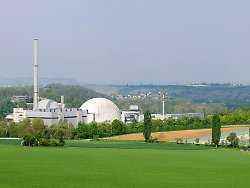To check further operation
FDP calls for nuclear power plant inventory
7/13/2022 4:32 am
The three nuclear power plants, which are scheduled to be taken off the grid at the end of the year, provide five percent of electricity production in Germany. In view of the energy crisis, does one have to talk about extending the service life? In contrast to the FDP, the SPD and the Greens clearly say no. But the Liberals are not giving up.
Despite the no of the coalition partners SPD and Greens, the FDP sticks to the demand to talk about an extension of the operating times of the three remaining German nuclear power plants. Group manager Johannes Vogel is demanding a serious technical examination from Economics Minister Robert Habeck. “We are in the worst energy crisis in decades and we want to willfully take safe and climate-neutral power plants off the grid of our own accord. That is absurd,” Vogel told the editorial network Germany (RND).
The maintenance-related delivery stop on the Baltic Sea pipeline Nord Stream 1 and the fear that Russia could allow the gas tap has reignited the discussion about the three nuclear power plants. They are scheduled to be shut down by the end of the year. Union politicians have also been demanding continued operation of the Isar 2, Emsland and Neckarwestheim 2 nuclear power plants for a long time due to an impending gas shortage.
Habeck and Environment Minister Steffi Lemke – both with the Greens – had advised against longer terms in a review in March. A small contribution to energy supply would be opposed to major economic, legal and security risks. An extension of the running times would not bring any additional amounts of electricity in the coming winter, but at the earliest in autumn 2023 after refilling with new fuel rods. The three nuclear power plants generate around five percent of Germany’s electricity production. The operators of the plants have also rejected extensions to the service life.
Vogel asked Habeck to take stock of the availability of fuel rods for continued operation. “The energy and economics minister should now ensure that we get a clean inventory at very short notice: how many fuel rods are still there in which power plant? And then we can continue the discussion.” The energy policy spokesman for the FDP parliamentary group, Michael Kruse, suggested a “nuclear power summit” in the “Welt”.
Energy industry wants to stick to the phase-out
The Union is also keeping up its pressure on the government. The CDU energy expert Mark Helfrich told the “Welt” that retrofitting with fuel rods is not necessary if you drive them with reduced power. The chairman of the European People’s Party (EPP), Manfred Weber from the CSU, told the Funke media group: “It is incomprehensible to people why an extension of the term is ruled out for ideological reasons, but coal-fired power plants are ramped up.”
The economy Veronika Grimm does not consider the nuclear power plants to be decisive. “Gas power generation can be replaced by coal power generation in the short term,” Grimm told the “Handelsblatt”. However, she considers the continued operation of the three nuclear power plants to be necessary for around five years. “As long as renewable energies are not sufficiently expanded and no gas-fired power plants have been built, we will have to keep and operate large numbers of coal-fired power plants in the system without nuclear power plants.”
The Federal Association of Energy and Water Management (BDEW), on the other hand, does not believe in longer terms. “For the energy industry in Germany it is clear: the decision has been made to phase out electricity generation from nuclear power. Nobody in the energy industry wants to go back to this risky and expensive technology,” said CEO Kerstin Andreae of the “Rheinische Post”.
